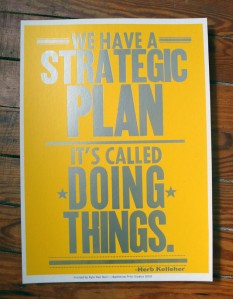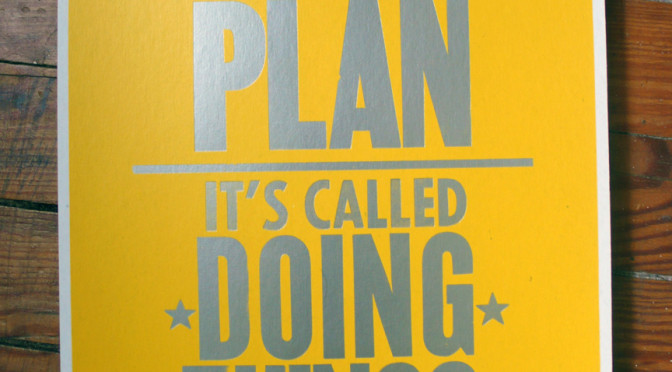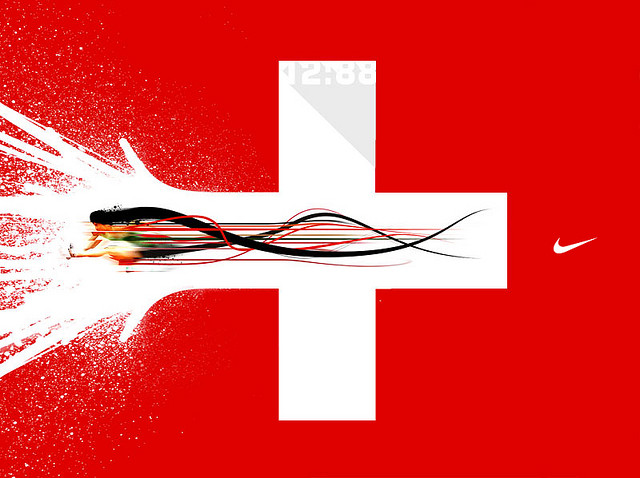 My job, technically, is developing social media strategy on behalf of our clients. I write a lot of ‘this is why social media is important for your business’-type documents. I work with some brilliant strategic thinkers.
My job, technically, is developing social media strategy on behalf of our clients. I write a lot of ‘this is why social media is important for your business’-type documents. I work with some brilliant strategic thinkers.
Sometimes, though, I wonder: why are we, as digitally focused communicators all so obsessed with strategy? Why are we all so impressed with ourselves when we come up with a cool strategy for a campaign, for a candidate, for a cause. Why do we have conferences, organizations, entire channels dedicated to strategic thought?
All I can come up with at this very moment is the following: Strategy is easy. Execution is not.
Talk is cheap, actions are not.
I had two very different experiences at conferences these last two weeks. I was fortunate enough to be invited to go to the Clinton Foundation’s “Clinton Global Initiative University” conference in Miami. CGIU is an organization where college-age folks can make ‘commitments’ to amke a difference in the world in one of several different areas, and are empowered by the Clinton name, and get together once a year to network, build resources, and present. A coworker and I went around with a Flip Camera and interviewed students about what they’re doing.  The answers were truly inspiring.
These 20-22 year olds were working to get schools built in starving nations, developing bike-share programs to cut down on greenhouse gasses, to getting legislation passed to address homeless needs. These millennials, who we are so quick to dismiss or try to box into our own limited ideals, are out there doing something that has a tangible positive affect on the health of the world. They aren’t spending their precious resources talking about engagement strategies, which video site to use to share the story, or ‘what facebook’s open platform means for oauth’. They’re just out there, looking at things that need fixing and fixing them.
In contrast (and I will keep the abuse to a minimum here), I went to the first day of Jeff Pulver‘s #140conf this past week. Now, Jeff has done a lot for the development of the web, and certainly has his heart in the right place with this conference, but the sheer amount of self-congratulatory “isn’t Twitter great, folks?” nonsense that permeated the tone of the panels and discussions was overwhelming enough that I could not bring myself to go back for day 2. Of course there were some great, inspiring conversations, but they were just that. Conversations.
The difference between these two experiences? One focused on strategy, and strategic discussions of tactics, and one was a demonstration of people doing the work.
In the end, all the ‘social media is important’ decks in the world won’t fix the problems in our society, even the ones we’re so intent on saying that communication and open dialogue will address.
So with all our hours of conversations about conversation, all our debates about where online communities are going, all our Tweets and Facebook status updates and blog posts, all our strategy and strategizing our action, what have we really done but talk. What have you done to change the world? Who would you place your bets on making a real sustainable difference in the health of the world?
Personally, my money’s on the doers.
Related articles by Zemanta
- The Strategy of No Strategy (socialmediatoday.com)
- The best strategy: Don’t strategize. (jeremymeyers.com)
- Social Media isn’t the game changer. Acting like humans is the game changer. (jeremymeyers.com)
- What “What ___ Can Teach us about blogging” can teach us about blogging. (jeremymeyers.com)







Jeremy,
I think my issue with your positioning here might be one of semantics.
The gap between theory and practice is one that definitely exists in social media circles. Purists love to theorize in general about social media — best practices, anecdotes of successful use cases, how one company reached XYZ goal using social media, etc.
These discussions are not about strategy, but about goals and tactics, which is a big part of the problem in the social media space. Discussions like this do little to explain actual strategy, in part because a business’ strategy is what should ideally give it a competitive edge in the marketplace in the eyes of consumers, but also because so few people seem to really grasp the concept of what goes into a strategy.
Ideally, a strategy should outline the approach, articulate the spirit with which the goals will be accomplished and align purposefully with an overarching business strategy. Very few people actually talk about real strategy at these events, but rather individual tactics and stories about how those tactics were utilized.
I think your beef has little to do with any obsession with strategic thinking and more to do with people who talk about creating change vs. those who do the work to create positive change.
In my mind they’re different subjects altogether.
.-= Shannon Paul´s last blog ..What Most Online Metrics Won’t Show You =-.
Jeremy,
Rock on, dude. I completely relate to everything in this post. I would imagine that you and I have similar day-to-day functions since we both work at large agencies and help account teams with digital recs/planning.
I was just telling my supervisor a few minutes ago (hence the tweet i posted), that I’m thirsting to get back into the trenches. Yes, my personal social media activity allows me to “be part of the community”, but I never get to steward the brand conversation.
Perhaps this gets back to the whole point of Brian Solis’s book, “Putting the Public Back in Public Relations”. The next evolution of PR will really come when every person at an agency is trained and empowered to function more like a community manager.
It’ll take more than a few years to get there, but it’s the only way, IMO that we’ll ever get to see this budding industry truly become “the way we do business”.
.-= Alexa´s last blog ..Facebook finally realizes that consumers are afraid of commitment =-.
Jeremy,
Strategy and tactics cannot effectively exist in their own isolated bubbles. They are meant to co-exist.
I actually see this as an examiner for IABC accreditation. The lower test scores are from two types of people: those with little strategic training and those with outmoded tactical knowledge. Really, the best strategy work comes from someone who knows how to implement it because they keep their skill sets sharp.
Best,
Rich
.-= Rich Becker´s last blog ..Overdosing On Climate Change: Earth Day =-.
Jeremy,
I think my issue with your positioning here might be one of semantics.
The gap between theory and practice is one that definitely exists in social media circles. Purists love to theorize in general about social media — best practices, anecdotes of successful use cases, how one company reached XYZ goal using social media, etc.
These discussions are not about strategy, but about goals and tactics, which is a big part of the problem in the social media space. Discussions like this do little to explain actual strategy, in part because a business’ strategy is what should ideally give it a competitive edge in the marketplace in the eyes of consumers, but also because so few people seem to really grasp the concept of what goes into a strategy.
Ideally, a strategy should outline the approach, articulate the spirit with which the goals will be accomplished and align purposefully with an overarching business strategy. Very few people actually talk about real strategy at these events, but rather individual tactics and stories about how those tactics were utilized.
I think your beef has little to do with any obsession with strategic thinking and more to do with people who talk about creating change vs. those who do the work to create positive change.
In my mind they’re different subjects altogether.
.-= Shannon Paul´s last blog ..What Most Online Metrics Won’t Show You =-.
Jeremy,
Rock on, dude. I completely relate to everything in this post. I would imagine that you and I have similar day-to-day functions since we both work at large agencies and help account teams with digital recs/planning.
I was just telling my supervisor a few minutes ago (hence the tweet i posted), that I’m thirsting to get back into the trenches. Yes, my personal social media activity allows me to “be part of the community”, but I never get to steward the brand conversation.
Perhaps this gets back to the whole point of Brian Solis’s book, “Putting the Public Back in Public Relations”. The next evolution of PR will really come when every person at an agency is trained and empowered to function more like a community manager.
It’ll take more than a few years to get there, but it’s the only way, IMO that we’ll ever get to see this budding industry truly become “the way we do business”.
.-= Alexa´s last blog ..Facebook finally realizes that consumers are afraid of commitment =-.
Jeremy,
Strategy and tactics cannot effectively exist in their own isolated bubbles. They are meant to co-exist.
I actually see this as an examiner for IABC accreditation. The lower test scores are from two types of people: those with little strategic training and those with outmoded tactical knowledge. Really, the best strategy work comes from someone who knows how to implement it because they keep their skill sets sharp.
Best,
Rich
.-= Rich Becker´s last blog ..Overdosing On Climate Change: Earth Day =-.